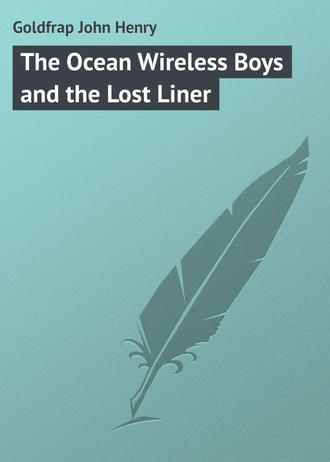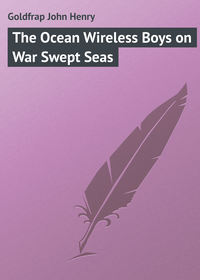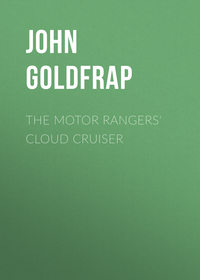 полная версия
полная версияThe Ocean Wireless Boys and the Lost Liner
“Of course the office is always open for business,” he rejoined, pushing a stack of sending blanks toward Jarrold.
“Of course,” replied Jarrold, sinking into a chair beside the young operator. “By the way, nothing from the Endymion yet?”
“That is the business of the line so far, sir,” replied Jack. “If it is anything of general interest, you will find the notice posted on the bulletin board at the head of the saloon stairs in the morning.”
Jarrold made no reply to this, but sat absent-mindedly tapping his gleaming white teeth with a gold-cased pencil as if considering what he should write on the blank paper before him. He appeared to be in no hurry to begin, but fumbling for his cigar case, produced a big black weed and leisurely lighted it, puffing out the heavy smoke with an abstracted air.
“Sorry, sir,” struck in Jack sharply, “but you can’t smoke in here, sir.”
“Why not?”
“It is against the rules.”
“Where do you see such a rule? Reckon you made it, eh? Too much of a molly-coddle to smoke, hey?”
The man’s tone was aggressive, offensive. The subtle objection to him that Jack had felt when they first met was growing with every minute. But he kept his temper. It was with an effort, however.
“There are the rules on the wall,” he said.
“Humph,” said Jarrold, with a disgusted grunt. “In that case I’ll throw my cigar away. But one always helps me to think.”
“Personally, I’ve always heard that tobacco dulls the brain,” retorted Jack, “but never having tried it, and not wanting to, I don’t know how true it is.”
Jarrold made no reply to this, but a contemptuous snort. He unfolded his big, loose-knit frame from the chair and went toward the door. He flung the cigar into the night. As he did so, there was a blinding flash of lightning. The rain was coming in torrents now, but the wind and sea were dying down.
The man came back to his chair and again appeared to be considering the message he should send out.
“I have my doubts about getting a message through to-night at all,” hinted Jack. “The rain doesn’t always interfere with the Hertzian waves but sometimes it does. Maybe you would better wait till morning.”
“I’ll send it when I choose,” was the growled reply.
At that instant Jack’s hand suddenly shot out across the desk in front of him and turned the switch that sent the current into the detectors. Faintly, out of the storm, some whispered dots and dashes had breathed against his ear-drums. Somebody was trying to send a radio.
Jarrold’s lounging figure stiffened up quickly. He had seen Jack’s sudden motion and guessed its meaning. He leaned forward eagerly while the young operator tuned his instruments till the message beat more strongly on his ears.
Through the storm the message came raggedly but it was intelligible.
“Tropic Queen! Tropic Queen! Tropic Queen!”
“Yes! Yes! Yes!” flung back the boy at the liner’s key. “Who is that?”
“Are you the Tropic Queen?”
The sending of the call across the storm was uncertain and hesitating; not the work of a competent operator, but still understandable.
“Yes, this is the Tropic Queen.”
The answer that came made Jack thrill up and down his spine.
“This is the Endymion!”
Then came a pause that vibrated. Jack pounded his key furiously. The sending on the other craft was bad, and the waves that were beating against the aërials of the Tropic Queen were weak. Although rain does not necessarily hamper the power of the Hertzian billows, and all things being equal the transmission of messages is clearer at night, yet certain combinations may result in poor service.
The spark writhed and squealed and glared with a lambent blue flame as it leaped like a serpent of fire between the points.
But even above its loud, insistent voice calling into the tempest-ridden night could be heard the deep, quick breathing of Jarrold as he leaned forward to catch every move of the young operator’s fingers.
“This is the Endymion,” came again.
“Yes! Yes!” flashed back Jack.
“Have you a passenger named Jarrold on board?”
Jack’s heart and pulses gave a bound. Jarrold was leaning forward till his bristling chin almost touched Jack’s cheek. The man’s hand stole back toward his hip pocket and stayed there.
“Yes, what do you want with him?”
“We – have – a – message – for him,” came the halting reply.
Jack’s fingers were on the key to reply when the quick, harsh voice of Jarrold came in his ear.
“That’s the Endymion. No monkey business now. Send what I tell you. I – ”
There was a sudden blinding flash from the instruments and a blaze of blue, hissing fire filled the wireless room.
Jarrold and the young wireless man staggered back, their hands flung across their faces to shield their eyes from the scorching glare. It was all over in an instant – just one flash and that upheaval of light.
“The aërials have gone!” cried Jack.
He darted from the wireless room, leaving Jarrold alone, a look of frustrated purpose in his eyes.
CHAPTER VI – A DARING FEAT
Out along the wet and slippery decks, spray-dashed and awash, rushed the boy. He was headed for the bridge. He found the first officer, Mr. Metcalf, on duty.
The officer was shrouded in gleaming oil-skins and sou’wester. Spray glistened on his cheeks and big mustache as the dim light from the binnacle revealed his features. Ahead of them Jack could make out dimly the big, plunging forepart of the ship as it rushed up a water mountain with glowing phosphorescent head, and then with a swirling roar went sliding down the other side.
“Well, Ready, what’s the trouble?” boomed out Mr. Metcalf good-naturedly. “You seem excited.”
“Yes, sir. I’ve just had a message.”
The officer was alert in a moment.
“A vessel in distress?”
“No, sir. Although – ”
“Well, well, be quick. On a night like this any call may be urgent.”
“This was from a yacht. The Endymion, she said her name was.”
“And she’s in trouble?”
Mr. Metcalf was one of those men who leap to instant conclusions. Already he was considering the best method of proceeding to the distressed – as he thought – ship’s assistance.
“No, in no trouble, sir. She had a message for a passenger, but in the middle of it something happened to our aërials.”
“They’ve parted?”
“I don’t know, sir. Anyhow, I’m going aloft to see. I came to report to you.”
“Nonsense, Ready, you can’t go aloft to-night. I’ll send a man.”
“Pardon me, Mr. Metcalf,” broke in Jack. “I don’t want to be disrespectful, but there’s not a man on this ship who could repair those aërials but myself.”
“But you are not used to going aloft,” protested Mr. Metcalf.
“I’ve been up on the Ajax’s masts in worse weather than this to fix anything that was wrong,” he said. “I’ll be all right. And besides, I must go. It’s my duty to do so.”
“Very well, then, but for heaven’s sake be careful. You’ve no idea what the trouble is?”
“No, sir, but I’m inclined to think it is the insulation that has worn and caused a short circuit somewhere. That could easily happen on a night like this.”
“Well, be off with you, Ready,” said the officer, not without reluctance. “Good luck.”
Jack descended from the bridge deck to the main deck. The ship was plunging and jumping like a race-horse. He could catch the wild movement of the foremast light as it swung in crazy arcs against the dark sky.
“Not a very nice night to go aloft,” thought the boy, with a shrug, “but it must be done.”
Temporarily he had forgotten all about Jarrold. All that lay in front of him was his duty, the stern necessity of repairing the aërials upon which it was possible human lives might depend. In the event of accident to the Tropic Queen, the existence of all on board might hang on the good condition of those slender strands of copper wire which alone connected the ship with other craft and dry land.
The wind screamed across the exposed main deck with locomotive-like velocity. Big waves, nosed aside by the bow, viciously took their revenge by sweeping like waterfalls across the ship’s stem. Jack was drenched through before he had fought his way to the weather shrouds, by which slender ladder he had to climb to the top of the swaying steel fore-mast, fully fifty feet above the lurching decks.
He had not put on oil skins and his blue serge uniform, soaked through, clung to his body like an athlete’s tights. But he was not thinking of this as he grabbed the lower end of the shrouds and prepared to mount aloft. A big sea swept across the exposed foredeck, almost beating the breath out of his body. But he clung with the desperation of despair to the steel rigging, and the next moment, taking advantage of a momentary lull, he began to mount.
Long before he reached the cross-trees, his hands were cut and sore and every muscle in his body taut as fiddle strings. About him the confusion and the noise of the storm shrieked and tore like Bedlam let loose.
But stubbornly the figure of the young wireless boy crept upward, flattened out by the wind at times against the ratlines to which he clung, and again, taking every fighting chance he could seize, battling his way up slowly once more. The cross-trees gained, Jack paused to draw breath. He looked downward. He could see, amid the inferno of raging waters, the dim outline of the hull. From that height it looked like a darning needle. As the mast swung, it appeared that with every dizzy list of the narrow body of the ship beneath, she must overturn.
Jack had been aloft often and knew the curious feeling that comes over a novice at the work: that his weight must overbalance the slender hull below. But never had he experienced the sensation in such full measure as he did that night, clinging there panting, wet, bruised, half-exhausted, but yet with the fighting spirit within him unsubdued and still determined to win this furious battle against the elements.
As he clung there, catching his breath and coughing the salt water from his lungs, he recollected with a flash of satisfaction that he had his rubber gloves in his pocket. These gloves are used for handling wires in which current might be on, and are practically shock-proof. Jack knew that he would have to handle the aërials when he got aloft, and if he had not his gloves with him, he would have stood the risk of getting a severe shock.
With one more glance down, in which he could perceive a dim, wet radiance surrounding the ship like a halo, proceeding from such lights as still were aglow on board, the boy resumed his climb.
The most perilous part of it still lay before him. So far, he had climbed a good broad “ladder” – the ratlines stretched between the three stout steel shrouds. From the cross-trees to the top of the slender mast, there was but a single-breadth foothold between the two shrouds running from the tip of the foremast to the cross-trees.
Far above him, cut off from his vision by darkness and flying scud, Jack knew that the footpath he had to follow narrowed to less than a foot in breadth. At that height the vicious kicking of the mast must be tremendous.
It was equivalent to being placed on the end of a giant, pliable whip while a Gargantuan Brobdingnagian driver tried to flick you off.
But Jack gritted his teeth, and through the screeching wind began the last lap of his soul-rasping ascent.
He was flung about till his head swam. His ascent was pitifully slow and tortuous. The reeling mast seemed to have a vicious determination to hurtle him through space into the vortex of waters below him, over which he was swung dizzily hither and yon.
But at last, somehow, with reeling brain, cut and bleeding hands and exhausted limbs, he reached the summit and stretched out cramped fingers for the aërials.
With the other hand he clung to the shrouds, and with legs wrapped round them in a death-like grip, he was dashed back and forth through midair like a shuttle-cock.
CHAPTER VII – QUARTERMASTER SCHULTZ VOLUNTEERS
Clinging with his interlocked lower limbs, Jack managed to draw on his insulated rubber gloves. Then he fumbled, with fear gripping at his cold heart, for his electric torch, which every wireless man carries for just such emergencies.
He pressed the button and a small, pitifully small, arc of light fell on the aërials where they were secured to the mast. Far beneath him on the bridge, the first officer and the wondering captain – who had been summoned from his berth – watched the infinitesimal fire-fly of light as it flickered and swayed at the top of the mast.
The storm wrack flew low and at times it was shut out from their gaze altogether. At such times both men gripped the rail with a dreadful fear that the brave lad, working far above them, had paid the penalty of his devotion to duty with his life.
But every time that they looked up after such a temporary extinguishment of the flickering light, they saw it still winking like the tiny night-eye of a gnome above them in dark space.
With fingers dulled by the thick rubber covering which he dared not remove, Jack worked among the aërial terminals. One by one he counted the strands.
One, two, three, four, five.
Yes, they were all there. But he did not count them as fast as that. Instead, between the fingering of one and another an interval of ten minutes might elapse, during which time he was flung from pole to pole, dry mouthed and dizzy.
Then came a sudden flash of lightning outlining the rigging, the steel hull far below him, the anxious figures on the bridge and the angry heavens in blue, glaring flame. But Jack had no eye for this. The sudden light had shown him a jagged rip in the insulation of the wires where they were joined to the mast rigging. Through this, current had been leaking into the mast and robbing the aërials of their power of sending or receiving, short circuiting the Hertzian waves.
Jack waited for a lull and then, almost dead with nausea and brain sickness from his wild buffeting, he reached for his electrician’s tape and began making hasty repairs on the electric leak. He bound coil after coil of the adhesive stuff around the exposed wire, till it was blanketed beyond chance of “spilling” into the rain.
Then, his work done, he rested for an instant to steady his whirling senses, and then began the long descent.
Now that the job was over, he felt that he could never live to reach the deck, miles and miles – hundreds and hundreds of miles – below him. Step by step, though, he descended, fighting for his life against the sense numbness that was creeping over him. Limbs and intelligence seemed equally absent. He felt as if he were a disembodied being, floating through space on the wings of the storm.
He appeared to have no weight. Like a thistle bloom he thought that he might be blown where the winds wished. Conquering this feeling, it was succeeded by a leaden one. He was too heavy to move. His feet felt enormous, and heavy as a deep-sea diver’s weighted boots. His head was balloon-like and appeared to sway crazily on his shoulders.
But he still descended. Step by step, painfully, semi-consciously, the brain-sick, nauseated boy clung to the ratlines. On his grip depended his life, and this, in a dim, stupid sort of way, he realized.
If he could only reach the cross-trees! Here he could rest in comparative security for a while.
He must reach them, he must! He wasn’t going to die like this. A furious fighting spirit came over him. His head suddenly cleared; the deadly nausea left him; his limbs grew light.
Jack shouted aloud and came swiftly down. He called out defiantly at the storm. He raved, he yelled in wild delirium.
All at once he felt the cross-trees under his feet. With a last loud cry of triumph he sank down on the projecting steel pieces that formed, at any rate, a resting place.
Then came another wild swing of the ship, and a vicious gust.
Jack felt himself flung from the cross-trees and out into the dark void of the storm.
Down, down, down he went, straight as a stone toward the dark, black, raging vortex through which the ship was fighting.
He felt rather than heard a despairing cry; but did not know whether it had come from his lips or not.
Then a rushing dark cloud enveloped him, and with a fearful roaring in his ears, Jack’s senses swam out to sea.
“The light has disappeared, Metcalf. Do you think the poor lad is lost?”
Far below on the bridge, Captain McDonald, oil-skinned like his officer, peered upward.
“The good Lord alone knows, sir,” was the fervent reply. “It was a madcap thing to do. I should never have let him go.”
“It’s done now,” muttered the captain. “Though, had you consulted me, I should have forbidden it. That boy is the bravest of the brave.”
“He is, sir. You may well say that. A seasoned sailorman might have hesitated to go aloft to-night.”
“I wish to heaven I knew what had become of him and if he is safe, yet I wouldn’t order another man up there in this inferno.”
There was a voice behind him.
“Vouldt you accepdt idt a volunteer, sir?”
“You, Schultz?” exclaimed the captain, turning around to the old quartermaster who was just going off his trick of duty at the wheel. “Why, man, you’d be taking your life in your hands.”
“I’ve been up der masts of sheeps off der Horn on vorse nights dan dees,” was the calm reply. “Ledt me go, sir.”
“You go at your own responsibility, then,” was the reply. “I ought not to let you up at all, and yet that boy – go ahead, then.”
The old German quartermaster saluted and was gone.
From the bridge they saw him for a moment, in the gleam of light from a porthole, crossing the wet deck.
He clambered into the shrouds and then began climbing upward along the perilous path Jack had already traveled.
“Pray Heaven we have not two deaths to our account to-night, Metcalf,” said the captain earnestly to his first officer.
“Amen to that, sir,” was the reply.
And then there was nothing but the shriek of the wind and the beat of the waves, while the two officers gazed piercingly upward into the darkness where they knew not what tragedies might be taking place.
CHAPTER VIII – SAFE ONCE MORE
Suddenly Captain McDonald had an inspiration.
“Metcalf!” he cried, above the storm.
“Sir!” was the alert response of the Tropic Queen’s chief officer.
“Order the searchlight turned on that mast!”
One of the two quartermasters, struggling with the bucking, kicking wheel, was ordered to get the apparatus ready and focus it on the foremast.
The canvas hood was taken off the big light and then a switch snapped, sputtering bluely. A radiant spear of light pierced the night. It hovered vaguely for a few instants and then settled on the foremast.
It revealed a thrilling scene. Schultz had clasped in his arms the unconscious form of Jack Ready. For the young wireless man, when he collapsed, had been caught by a stay and held in position on the cross-trees.
Slowly, and with infinite caution, the old quartermaster began to descend the shrouds. It was a nerve-racking task to those looking on. Jack was not a light-weight, and the descent of his rescuer, clasping the boy with one arm while he held on with all his strength, was painfully slow.
But at last they reached the deck in safety, and Captain McDonald was there in person to meet them. He wrung Schultz’s hand in a tight grip as the old seaman stood pantingly before him.
“That was as brave a bit of work as I’ve seen done since I’ve been going to sea, Schultz,” he exclaimed. “I’ll see to it that the company gives you recognition. But now let us take this lad to my cabin. He’s opening his eyes and the doctor can give him something that will soon set him on his feet again.”
And so it proved. Half an hour after Jack had been laid on a lounge in the skipper’s cabin and restoratives had been administered by Dr. Flynn, he was feeling almost as hale and hearty as ever, although his terrible ordeal when he was flung back and forth pendulum-wise had left him with a racking headache.
The captain showered congratulations on him, but reminded him that never again must he risk his life in such a perilous way.
“The job could have waited till daylight, anyhow,” he said.
“I beg your pardon, sir,” said Jack, firmly but respectfully, “it could not. You know that I was in communication with a ship – the yacht Endymion– when the insulation wore away and my ‘juice’ began to leak?”
“No, I knew no such thing,” said the captain.
“Mr. Metcalf knew of it, sir.”
“In all the excitement caused by your exploit, young man, he must have forgotten to tell me.”
“That was probably the reason, sir. But the Endymion– ” The captain broke in as if struck by some sudden thought.
“Jove, lad, the Endymion, you say?”
“Yes, sir, do you know her?”
“I know of her. She bears no good reputation. Once she was chartered to the Haytian government and was used as a war ship; then she was in the smuggling trade along the coast. The last I heard of her she was laid up in the marine Basin at Ulmer Park. Her history has been one of troubles. Do you feel strong enough to go back to your key?”
“Yes, sir,” exclaimed Jack eagerly. “Young Smalley, my assistant, is too seasick to work to-night. I’ll take the trick right through.”
“Good for you, my boy. I’ll see that you are no sufferer by it. By the way, did the Endymion have any message? Was she in trouble?”
“No, sir, but they wished to give some sort of a radio to a Mr. James Jarrold, one of the first-class passengers.”
The captain tapped his foot musingly on the polished wood floor of his cabin.
“Odd,” he mused, “I wonder what possible communication they could have to make to him. Is Jarrold a heavy-set man with a blue, square jaw and bristly, black hair?”
“Yes, sir, that is the man to the dot.”
“I have noticed him at dinner. He sits at the first officer’s table. Back in my head I’ve got a sort of indefinable idea that I’ve seen him somewhere before, but just where I cannot, for the life of me, call to mind just now.”
“It is too bad that the aërials went out of commission just as that other operator was starting to give the message.”
“It was, indeed, but you must try now to pick up this Endymion again. I’m curious to know more of her and of our mysterious passenger.”
“I’ll report to you the instant I get anything, sir,” Jack assured him, and hurried off.
On the way he passed Schultz and put out his hand with direct, sailor-like bluntness.
“You saved my life to-night, Schultz. I’ll never forget it,” he said simply, but there was a wealth of feeling behind the quiet words.
“Oh, dot makes it no nefer mindt, Yack,” said the old German. “Don’t get excitedt ofer idt. Idt vos just a yob dot hadt to be done und I didded idt.”
“It was a great deal more than that,” said Jack, with warmth. “I hope some day I will get a chance to repay you.”
But Schultz, embarrassed and red as a beet under his tan, had hurried off. Like most sailors, Schultz hated sentiment. To him, his daring deed of saving Jack from his perilous perch in the cross-trees had been all in the line of duty.
Back in the wireless room once more, Jack looked in on Sam. The boy was sitting up in bed staring feverishly out into the wireless room.
“Oh, Jack, I’m glad you have come back!” he exclaimed. “Where have you been?”
“Fixing a little job of work, youngster. Something was wrong with the wireless. How do you feel?”
“Better, but oh, what a head! It’s the worst feeling I ever knew!”
“Like something to eat?”
“For heaven’s sake, don’t mention it! The mere thought makes me feel bad again. But, listen, Jack, I’ve something to tell you. I wakened about half an hour ago and there was a man out there in the wireless room.”
“What?”
Jack had temporarily forgotten all about Jarrold. Now Sam’s remark brought the earlier scene back to him. What had Jarrold been doing in the wireless room while he was absent?
CHAPTER IX – THE MIDNIGHT INTRUDER
“He was stooping over the desk, rummaging about the papers and dispatches,” said Sam in response to Jack’s eager questions.









